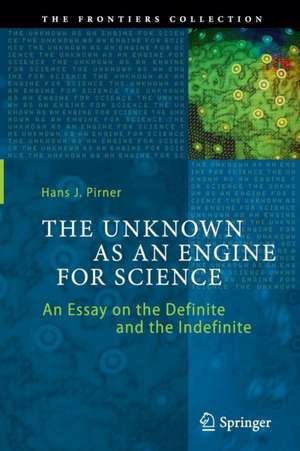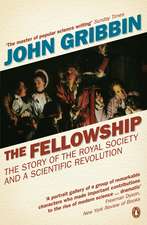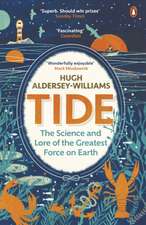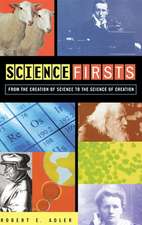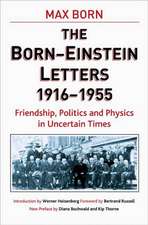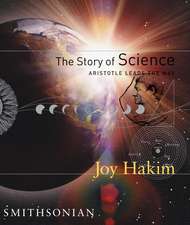The Unknown as an Engine for Science: An Essay on the Definite and the Indefinite: The Frontiers Collection
Autor Hans J. Pirner Traducere de William D. Breweren Limba Engleză Paperback – 17 oct 2016
The first part shows how information helps to reduce indefiniteness. Understanding rests on our ability to find the right context, in which we localize a problem as a point in a network of connections. New elements must be combined with the old parts of the existing complex knowledge system, in order to profit maximally from the information. An attempt is made to quantify the value of information by its ability to reduce indefiniteness.
The second part explains how to handle indefiniteness with methods from fuzzy logic, decision theory, hermeneutics and semiotics. It is not sufficient that the new element appears in an experiment, one also has to find a theoretical reason for its existence. Indefiniteness becomes an engine of science, which gives rise to new ideas.
| Toate formatele și edițiile | Preț | Express |
|---|---|---|
| Paperback (1) | 360.68 lei 6-8 săpt. | |
| Springer International Publishing – 17 oct 2016 | 360.68 lei 6-8 săpt. | |
| Hardback (1) | 461.96 lei 6-8 săpt. | |
| Springer International Publishing – 10 iun 2015 | 461.96 lei 6-8 săpt. |
Din seria The Frontiers Collection
- 20%
 Preț: 474.66 lei
Preț: 474.66 lei - 17%
 Preț: 366.23 lei
Preț: 366.23 lei -
 Preț: 282.08 lei
Preț: 282.08 lei -
 Preț: 333.48 lei
Preț: 333.48 lei -
 Preț: 296.58 lei
Preț: 296.58 lei - 17%
 Preț: 493.42 lei
Preț: 493.42 lei -
 Preț: 374.72 lei
Preț: 374.72 lei -
 Preț: 283.07 lei
Preț: 283.07 lei - 17%
 Preț: 525.36 lei
Preț: 525.36 lei -
 Preț: 203.86 lei
Preț: 203.86 lei -
 Preț: 375.63 lei
Preț: 375.63 lei -
 Preț: 337.23 lei
Preț: 337.23 lei -
 Preț: 213.85 lei
Preț: 213.85 lei -
 Preț: 306.17 lei
Preț: 306.17 lei - 20%
 Preț: 322.62 lei
Preț: 322.62 lei -
 Preț: 257.65 lei
Preț: 257.65 lei -
 Preț: 268.73 lei
Preț: 268.73 lei -
 Preț: 257.84 lei
Preț: 257.84 lei -
 Preț: 304.52 lei
Preț: 304.52 lei -
 Preț: 474.53 lei
Preț: 474.53 lei - 15%
 Preț: 508.67 lei
Preț: 508.67 lei - 5%
 Preț: 363.78 lei
Preț: 363.78 lei -
 Preț: 459.22 lei
Preț: 459.22 lei - 15%
 Preț: 559.04 lei
Preț: 559.04 lei - 15%
 Preț: 515.33 lei
Preț: 515.33 lei - 15%
 Preț: 572.50 lei
Preț: 572.50 lei - 15%
 Preț: 613.63 lei
Preț: 613.63 lei -
 Preț: 380.72 lei
Preț: 380.72 lei -
 Preț: 367.98 lei
Preț: 367.98 lei -
 Preț: 370.16 lei
Preț: 370.16 lei - 15%
 Preț: 452.91 lei
Preț: 452.91 lei - 15%
 Preț: 450.14 lei
Preț: 450.14 lei - 15%
 Preț: 506.23 lei
Preț: 506.23 lei -
 Preț: 369.06 lei
Preț: 369.06 lei -
 Preț: 467.89 lei
Preț: 467.89 lei -
 Preț: 373.61 lei
Preț: 373.61 lei -
 Preț: 435.77 lei
Preț: 435.77 lei
Preț: 360.68 lei
Nou
Puncte Express: 541
Preț estimativ în valută:
69.05€ • 74.81$ • 57.66£
69.05€ • 74.81$ • 57.66£
Carte tipărită la comandă
Livrare economică 12-26 decembrie
Preluare comenzi: 021 569.72.76
Specificații
ISBN-13: 9783319386379
ISBN-10: 3319386379
Pagini: 163
Ilustrații: XVII, 146 p. 23 illus.
Dimensiuni: 155 x 235 x 9 mm
Greutate: 0.24 kg
Ediția:Softcover reprint of the original 1st ed. 2015
Editura: Springer International Publishing
Colecția Springer
Seria The Frontiers Collection
Locul publicării:Cham, Switzerland
ISBN-10: 3319386379
Pagini: 163
Ilustrații: XVII, 146 p. 23 illus.
Dimensiuni: 155 x 235 x 9 mm
Greutate: 0.24 kg
Ediția:Softcover reprint of the original 1st ed. 2015
Editura: Springer International Publishing
Colecția Springer
Seria The Frontiers Collection
Locul publicării:Cham, Switzerland
Cuprins
Introduction.- Evidence for the Indefinite.- Approaching the Definite.- Establishing the Definite from the Indefinite.- The Unknown as an Engine of Science: Summary.
Notă biografică
Hans J. Pirner is a theoretical physicist, who obtained his degree in the US. After working at the Niels Bohr Institute in Copenhagen, at CEA Saclay in Paris and at CERN in Geneva, he became professor of physics in Heidelberg in 1988 specializing in particle physics and nuclear physics. In the Marsilius-Kolleg, center of interdisciplinary research in Heidelberg, the problem of “vagueness” in analytic philosophy triggered his research of uncertainty at the edges of science.
Textul de pe ultima copertă
This book explores the limits of our knowledge. The author shows how uncertainty and indefiniteness not only define the borders confining our understanding, but how they feed into the process of discovery and help to push back these borders. Starting with physics the author collects examples from economics, neurophysiology, history, ecology and philosophy.
The first part shows how information helps to reduce indefiniteness. Understanding rests on our ability to find the right context, in which we localize a problem as a point in a network of connections. New elements must be combined with the old parts of the existing complex knowledge system, in order to profit maximally from the information. An attempt is made to quantify the value of information by its ability to reduce indefiniteness.
The second part explains how to handle indefiniteness with methods from fuzzy logic, decision theory, hermeneutics and semiotics. It is not sufficient that the new element appears in an experiment, one also has to find a theoretical reason for its existence. Indefiniteness becomes an engine of science, which gives rise to new ideas.</p>
The first part shows how information helps to reduce indefiniteness. Understanding rests on our ability to find the right context, in which we localize a problem as a point in a network of connections. New elements must be combined with the old parts of the existing complex knowledge system, in order to profit maximally from the information. An attempt is made to quantify the value of information by its ability to reduce indefiniteness.
The second part explains how to handle indefiniteness with methods from fuzzy logic, decision theory, hermeneutics and semiotics. It is not sufficient that the new element appears in an experiment, one also has to find a theoretical reason for its existence. Indefiniteness becomes an engine of science, which gives rise to new ideas.</p>
Caracteristici
A fresh vision of the (as yet) unknown Well written and clearly structured investigation of how we arrive at secure scientific knowledge Stands out for its wide range of examples, beginning with physics but extending to neuroscience, ecology and economics Employs fuzzy logic and other methods developed in information science to handle uncertainty in science Includes supplementary material: sn.pub/extras
